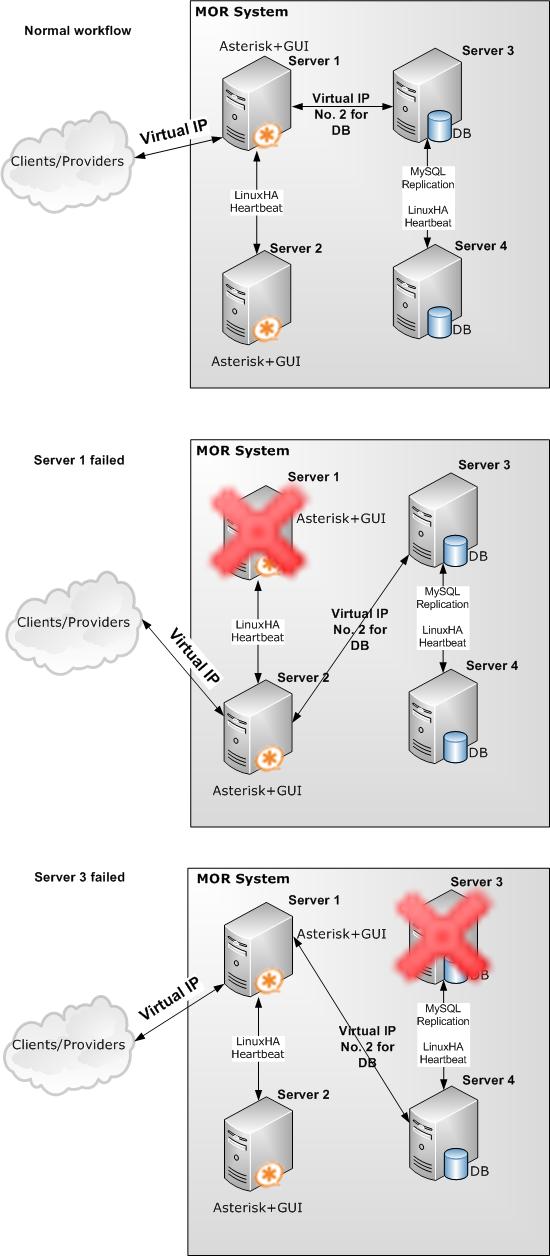Difference between revisions of "4 server redundant solution"
From Kolmisoft Wiki
Jump to navigationJump to search
| (11 intermediate revisions by the same user not shown) | |||
| Line 1: | Line 1: | ||
[[Image:4_redundant_with_linuxha.jpg]] | [[Image:4_redundant_with_linuxha.jpg]] | ||
'''Network setup''' | |||
* Servers 1 and 2 (S1 and S2) are identical. They | * Best scenario when all 4 servers are on same LAN (subnet). | ||
* Both of them have two network interfaces - one for | * Other possible solutions: Server 1 and 2 are on one LAN, Server 3 and 4 are on a different LAN (subnet). A VPN for better security from | ||
server 1 and 2 to server 3 and 4 can be made. | |||
* If all 4 servers are on different LANs (subnets) in that case between servers VPNs have to be configured. Drawback - such setup | |||
management becomes too complicated. | |||
* If servers are in the different countries (continents), it might cause latency problems which has negative influence on the speed of retrieving/instering data to the DB (loading statistics, trying to retrieve some data, searching for a sound file, etc. will longer than usually). <br> | |||
'''Workflow''' | |||
* Servers 1 and 2 (S1 and S2) are identical. They serve as gateways with Asterisk + MOR installed. | |||
* Both of them have two network interfaces - one for [http://en.wikipedia.org/wiki/Virtual_IP_address Virtual IP] which is visible from outside, and one for local IP for interconnection [[Linux Heartbeat | heartbeat monitoring]] | |||
* LinuxHA heartbeat monitors servers, e.g. | * LinuxHA heartbeat monitors servers, e.g. | ||
** When S1 fails - S2 sees that and after 10s (default) will take | ** When S1 fails - S2 sees that and after 10s (default) will take Virtual IP, e.g. will start to serve calls, it is done automatically | ||
** When S1 is back up - S2 returns | ** When S1 is back up - S2 returns Virtual IP to S1 and system starts to function in normal work flow (done automatically). | ||
* Servers 3 and 4 (S3 and S4) are identical. They | * Servers 3 and 4 (S3 and S4) are identical. They serve as MySQL DB. | ||
* Both of them have two network interfaces - one for | * Both of them have two network interfaces - one for Virtual DB IP (Virtual IP No. 2) which is visible for Asterisk servers S1 and S2, and one for local IP for interconnection [[Linux Heartbeat | heartbeat monitoring]] | ||
* LinuxHA heartbeat monitors servers, e.g. | * LinuxHA heartbeat monitors servers, e.g. | ||
** When S3 fails - S4 sees that and after 10s (default) will take | ** When S3 fails - S4 sees that and after 10s (default) will take Virtual IP, it is done automatically | ||
** When S3 is back up - S4 returns | ** When S3 is back up - S4 returns Virtual IP to S3 and system starts to function in normal work flow (done automatically). | ||
** S1 connects to S3 over | ** S1 connects to S3 over Virtual DB IP | ||
* DBs on S3 and S4 are synchronized over MySQL Replication | * DBs on S3 and S4 are synchronized over MySQL Replication | ||
Latest revision as of 12:35, 6 February 2012
Network setup
- Best scenario when all 4 servers are on same LAN (subnet).
- Other possible solutions: Server 1 and 2 are on one LAN, Server 3 and 4 are on a different LAN (subnet). A VPN for better security from
server 1 and 2 to server 3 and 4 can be made.
- If all 4 servers are on different LANs (subnets) in that case between servers VPNs have to be configured. Drawback - such setup
management becomes too complicated.
- If servers are in the different countries (continents), it might cause latency problems which has negative influence on the speed of retrieving/instering data to the DB (loading statistics, trying to retrieve some data, searching for a sound file, etc. will longer than usually).
Workflow
- Servers 1 and 2 (S1 and S2) are identical. They serve as gateways with Asterisk + MOR installed.
- Both of them have two network interfaces - one for Virtual IP which is visible from outside, and one for local IP for interconnection heartbeat monitoring
- LinuxHA heartbeat monitors servers, e.g.
- When S1 fails - S2 sees that and after 10s (default) will take Virtual IP, e.g. will start to serve calls, it is done automatically
- When S1 is back up - S2 returns Virtual IP to S1 and system starts to function in normal work flow (done automatically).
- Servers 3 and 4 (S3 and S4) are identical. They serve as MySQL DB.
- Both of them have two network interfaces - one for Virtual DB IP (Virtual IP No. 2) which is visible for Asterisk servers S1 and S2, and one for local IP for interconnection heartbeat monitoring
- LinuxHA heartbeat monitors servers, e.g.
- When S3 fails - S4 sees that and after 10s (default) will take Virtual IP, it is done automatically
- When S3 is back up - S4 returns Virtual IP to S3 and system starts to function in normal work flow (done automatically).
- S1 connects to S3 over Virtual DB IP
- DBs on S3 and S4 are synchronized over MySQL Replication
More info:

